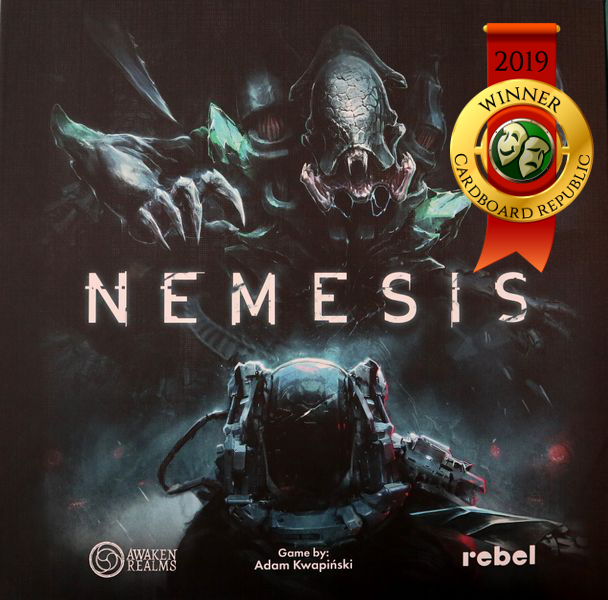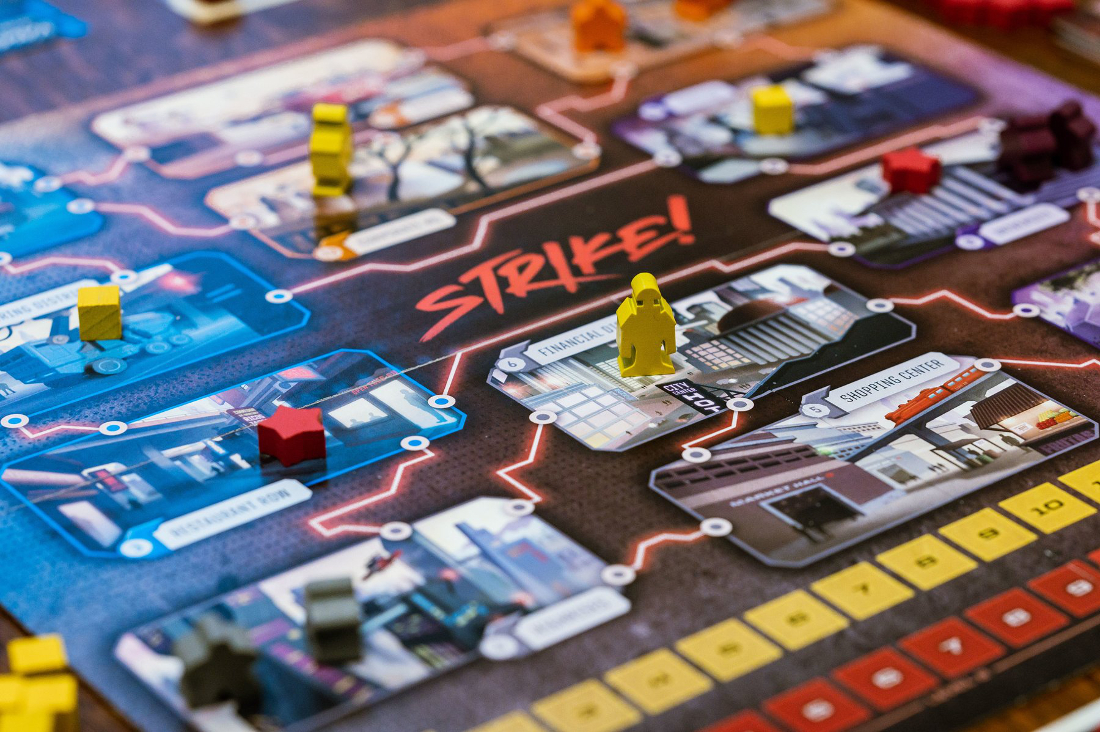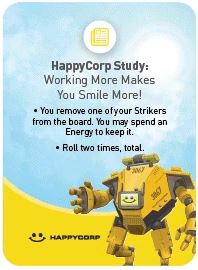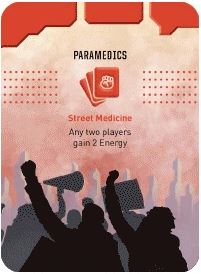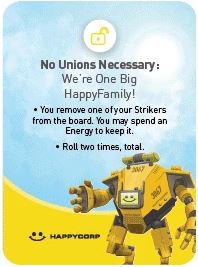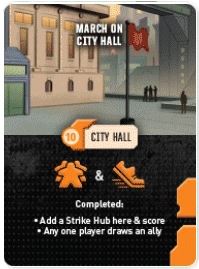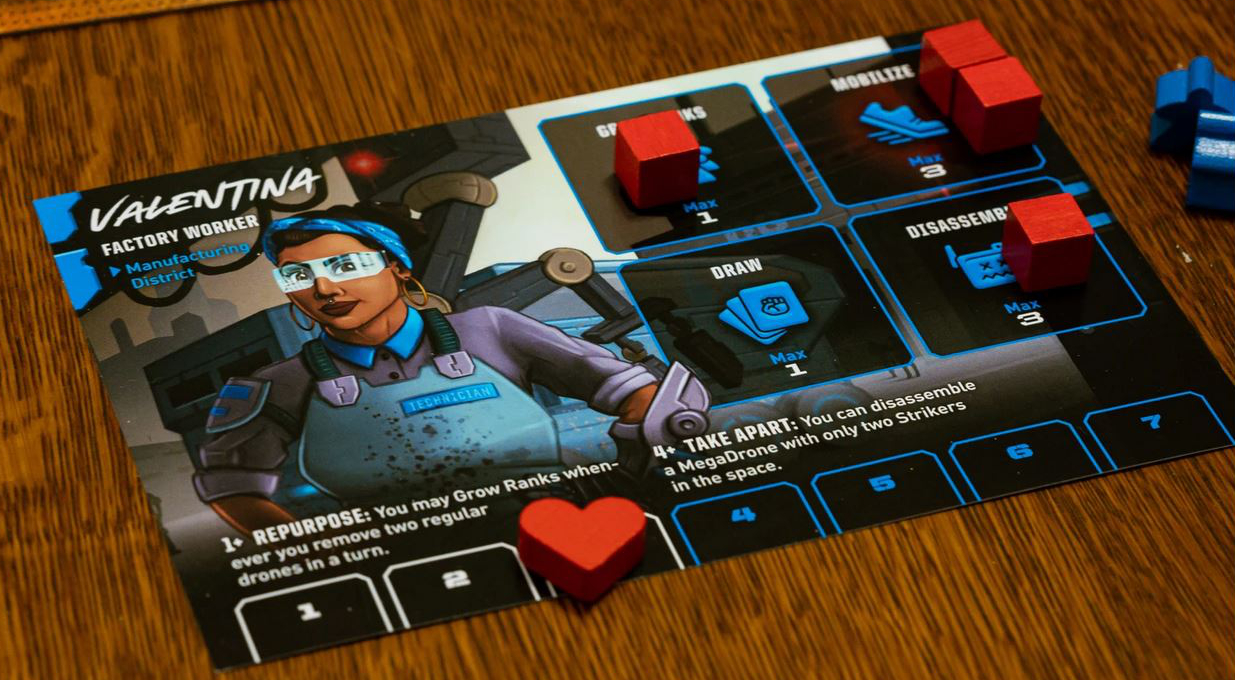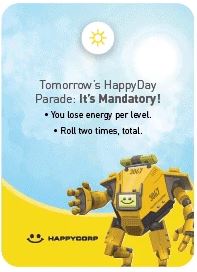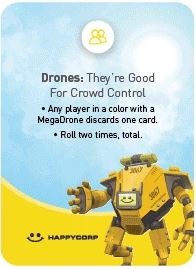As part of our August Spotlight on STRIKE!, we strive to inform readers of little extra tidbits surrounding the game. Games are made by people, and one of those tidbits we enjoy is learning a little bit more about the people behind them. Some designers shy away from the public stage, while others enjoy being front and center.
The first thing you may notice in that respect is that we’re not longer in August, which we admit was an unforeseeable situation. See, as it turns out, we made plans early on to talk with designer Brian Van Slyke about his latest title, but it turns out he was on a COVID-related strike and was largely unavailable until the final week or so. And far be it from us to cross the lines to interview someone else – we’re no scabs after all! So we had to bide our time while Brian and his merry band of fierce warriors fought the good fight until things died down again.
Or, at least, that’s the story we’ve chosen to run with. Because although it is true Brian was caught up most of the month with pandemic-adjacent matters, the underlying factors around it were more, shall we say, mundane.
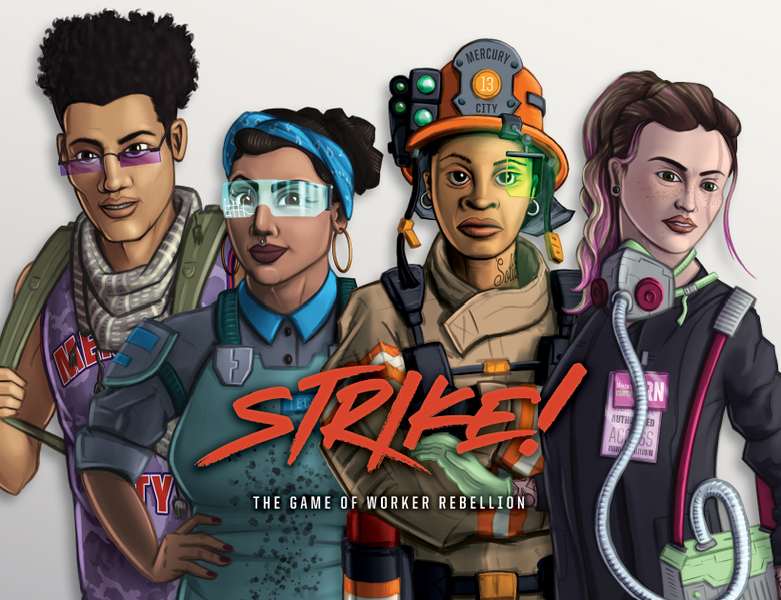 But to be fair, our version isn’t all that far-fetched in the current environment.
But to be fair, our version isn’t all that far-fetched in the current environment.
One person who can attest to that is Brian himself, the current lead designer at the TESA Collective: a worker-run cooperative that operates as one part educational resource agency, one part social advocacy group, and one part game publisher.
As Brian explains in the interview below, both his own design visions, as well as that of TESA, is to craft games around themes of social advocacy – which brings with it both a series of advantages and additional challenges to overcome. That balance is on full display with his latest title STRIKE!, a co-op about the power of workers rights and wielding that power to stave off the machinations of an encroaching, all-consuming mega corporation trying to take over your town. In this game, it’s up to the players to pool their resources, rally the the city folk to your cause, recruit allies, and organize strikes to prevent the too-good-to-be-true HappyCorp from gaining a permanent foothold as it slowly takes over every facet of your lives.
And the fact that this sounds like an exaggerated (if still plausible) theme is entirely deliberate.
This candid approach to game design and the idea of pushing topical themes to the forefront – while still ensuring it’s fun – came across intriguing, and even a little bold, as many publishers prefer to shy away from real-world issues. Brian and crew, on the other hand, dive in head first. We therefore determined it was well worth the wait so we could sit down and chat about why that approach matters so much to him, and why it’s actually a positive for the hobby itself as well. We share part of that conversation with you today.
Enjoy!
Round One Questions
CR: What was your Gateway Game?
Gosh, it’s hard to say. I’ve played games on and off my whole life. Growing up, I played SkipBo, Sorry, and the classics. So games have always been a part of my life. About 9 years ago, though, I started playing Discworld with my brother-in-law and his family during holidays. I think that’s one of the games that really kicked my appreciation for board games and everything they can be into high gear. It’s a shame because I don’t really think anyone else plays it these days!
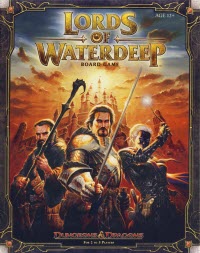
CR: What was the last game you really enjoyed playing (besides your own titles)?
I just played Lords of Waterdeep two nights ago with my wife! I am a late entry to this game, but I love it! Such a simple and smooth to play worker placement game. I think we’ve played it five times in the past few weeks.
CR: How big is your game collection?
Not as huge as you’d expect a game designer’s collection to be. Maybe 30 games. Before the days of COVID, I frequented game nights that a lot of people brought their copies of games to, so I was always sharing other people’s games. Communal game collections!
CR: What is your favorite type of game to play?
I am going to take this question a little differently and not say a specific type of game, but instead say games with high levels of theme and storytelling. If I’m producing a resource, I want to know why. If we are battling, I want to know why. I love the immersive elements of games. I want to be part of a story that’s unfolding. I’m not usually playing games to try to prove I am the smartest person at the table (especially because I’m usually not), but instead to be part of a shared experience and story. So yeah, I love high-theme games!
CR: How do you feel about Monopoly?
I feel that Monopoly has a hidden radical history that not enough people know about! It was created by a radical woman, Lizzie J. Magie, as a game to teach about alternative economics. I was interviewed in Teen Vogue about this a little while ago, actually. It’s probably one of my crowning achievements. You can read my interview here.
On Strike!
CR: Let’s start off with the TESA Collective. TESA (Toolbox for Education and Social Action) is not your standard game publisher. Can you explain the overall mission of the company and how TESA decided to utilize gaming as an advocacy vehicle?
We believe games are powerful tools to advocate for social change. As I said above, I love games that tell stories. So I try to make games that allow people to imagine themselves as change agents in specific issues or movements, whether that’s worker rights, economic justice, movement building, and so on.
TESA actually does a few things. We create educational tools and resources for nonprofits, city governments, and community groups. We create custom games for these groups too (like The Nature Conservancy, International Rescue Committee, and more). And then we also create our own games for social change that we publish and distribute.
The games we create to sell ourselves have a mission to merge cause and play: we want people to be able to engage with and explore their values, while also having a fun time.
CR: Which element for the company came first: the desire to create games with educational and activist themes or the desire to create educational resource tools about social causes?
The latter. We initially created a single board game as an activist tool, and it was supposed to be a one-off. But after multiple years, people were still buying it and still asking for new games from us. We even did a second printing of that game and it kept selling. So we thought: “Hey, maybe we should make more of these…”
Our company has been around for 10 years (wow, that feels weird to say). Our first game was published 9 years ago. We’ve been seriously publishing other games for five years now. That is one of our strengths as a worker-owned cooperative: we can be flexible and change paths if we see new routes we want to pursue.
CR: Have you noticed any difference in how TESA games are received by casual or non-gaming audiences versus more enfranchised hobbyists? If so, why do you think that is?
Oh yeah, for sure. Of course there are some people who dismiss our games or say…unkind things…to us. Whatever. We’re not for them. We’re for people who want to play games and want to change the world.
It definitely is a constant struggle I find for myself, though, as the company’s game designer. I want to create games that people who play lots of games want to play, but the people who buy our games are a broad range of players. Some have never played games before; some are hardcore gamers. So we get different feedback from people on the same game that it’s both too simple and too complicated. At the end of the day, though, we have to find the right balance to strike (pun only mildly intended), while also making games we want to play ourselves.
CR: Strike! is not the first title the company has made with a topical message – TESA has previously made games about building a successful social uprising and space-faring cats fighting against a rising tide of fascism. Why do you feel games make decent vehicles for these kinds of social justice themes?
Because activists want to have fun. It was Emma Goldman who said, “If I can’t dance, I don’t want to be part of your revolution”. That extends beyond dancing – to fun and joy in all of its mediums.
But in addition to that, games allow people to take risks and explore things they might not want to risk in real life. Games allow people to see themselves as change agents, to view how they might actually build a social movement, or topple the rising tide of fascism, or build a more democratic economy. Games are immersive: they allow us to not just read about a subject but to be part of the subject. To me that is incredibly important.
CR: Have you played any other games (or taken inspiration thereof) that do a decent job conveying historical or topical activism?
For sure. During social distancing, my wife and I have been playing Endangered, which is a game about saving endangered species. We’ve been enjoying that!
CR: Similarly, what are some of the unique challenges to such messages (if any), as opposed to traditionally “safer” thematic game choices? What do you say to those who argue that such topics aren’t worth it because they aren’t salable enough?
First, the big challenge is that the theme has to match the mechanics. People get really logical with board games that are trying to convey a message or are on a serious issue. That’s actually why we’ve been starting to create some games with a little bit of a sci-fi and fantastical theme, like Space Cats Fight Fascism. Even STRIKE! is set in a near future city. So in Space Cats Fight Fascism, I can just say “in the year 3 Million, cats can teleport. That’s why you can move across the galaxy in one action.” And people are like “yeah cool, that makes total sense.” So embracing that fantastical element, while still making games on serious subjects, allows us to both bring in some levity to a game (so people are more inclined to play it), but it also allows us to make mechanics easier to digest.
In terms of if they are or aren’t marketable enough? Well, it’s worked for us. Just find your audience, get to know them, and build games they want to play. There’s tons of people in the world who both want to make it a better place and who also want to play games. In fact, our game sales have been increasing every year. I think there’s room for so many more social justice games than we have the ability to make. Will it sell as well as Terraforming Mars or Roor or Apples to Apples? Nah. But so what? Few games will.
In fact, I think having a game with a message allows you to reach a niche that is often not spoken to. I think it’s an asset more than anything else. You stand above the noise.
CR: You mentioned TESA also makes custom games for specific courses and groups. What is the design/development experience like making a highly tailored game such as those compared to others for wider consumption?
It’s super hard and super enjoyable all at once. You are making games for people who are passionate about the subject matter, and you don’t know as much as they do about that subject. So there are some things to figure out there, balancing important issues with making a fun game. But getting to learn the subject matter directly from them and help them craft a game around the subject they care so much about is such a joy.
CR: STRIKE! is a worker placement co-op about the denizens of a city trying to halt the insidious HappyCorp from coming in and taking over every aspect of their lives, which you worked in tandem with the Jobs with Justice organization on creating. Which facets within the final game do you particularly feel hammer home that pro-workers message?
I’m cheating here…but everything. I wanted this game to ooze its pro-worker message. Everything you do in this game is about sticking it to the evil corporation that is trying to take over your city: from disassembling their drones, to organizing strikes in the harbor and the university, to recruiting new union members, and so on. There wasn’t a part of this game that I didn’t want to shout, “Worker Power!”
CR: It’s interesting that in the game, the evil HappyCorp doesn’t just operate on the traditional axis of labor vs management but instead takes on a 21st Century concern of an all-consuming megacorp. Do you feel that is a harder message to convey because it’s more complex or easier because it has relevance in today’s world?
Definitely easier. We talked a lot about if we wanted it to be hyper realistic or an exaggeration of what things could become. Eventually we chose the option of making it a game set in the near future, because we wanted this to be a culture change project. We didn’t just want it to appeal to worker rights’ folks – we wanted it to appeal to people who loved playing games and were at least open to the issue. Once the theme felt more like a video game or a movie, we knew we were headed in the right direction.
CR: Finally, since we assume you’re not a secret HappyCorp spy, what is the ultimate message you’d like players to take away from playing STRIKE?
Yes, yes, I’m not a HappyCorp spy… very good…
But seriously: Worker power requires solidarity. That’s why we made this a highly cooperative game: you have to strategize together and help each other gain energy, recruit more workers to the cause, and complete strikes. Alone, we’re easy to take down. Together, we’re powerful.
We are going to go out on a limb here and assume that if you’ve reached this point, you’re probably not on the HappyCorp payroll. Mostly because this sort of chatter to them is neither seen as productive nor sanctioned. After all, they would argue, why waste your time fighting against the inevitable? In their mind, they’ve just begun their assault on your town and yet it’s only a matter of time until they win. Why would anyone willingly choose to be uncomfortable and defend the rights of someone else they barely know when there are brand new shows to watch, trinkets to buy, and other pleasant distractions to occupy your time instead?
They’ve already decided that such conversations aren’t worth your time. And they’re perfectly fine with you standing about and sharing subversive thoughts while HappyCorp traces your computer. For your own protection, of course.
But if you’re serious about actually taking a stand and helping out your fellow citizens, then we may have an opportunity for you.

Through some extensive trial and error, we believe we have found a way to counteract the influence of companies like HappyCorp. However, launching full-scale city-wide insurrections on your behalf are a little difficult for us to do from afar. So instead we’ve cobbled together a copy of STRIKE that you can use as a scaled-down rebellion simulator to test your tactics before launching the real deal. And we’re raffling it off at the link below!
If I Had A Hammer: A Strike! Giveaway
Photo Credits: STRIKE! covers and photos by TESA Collective.

